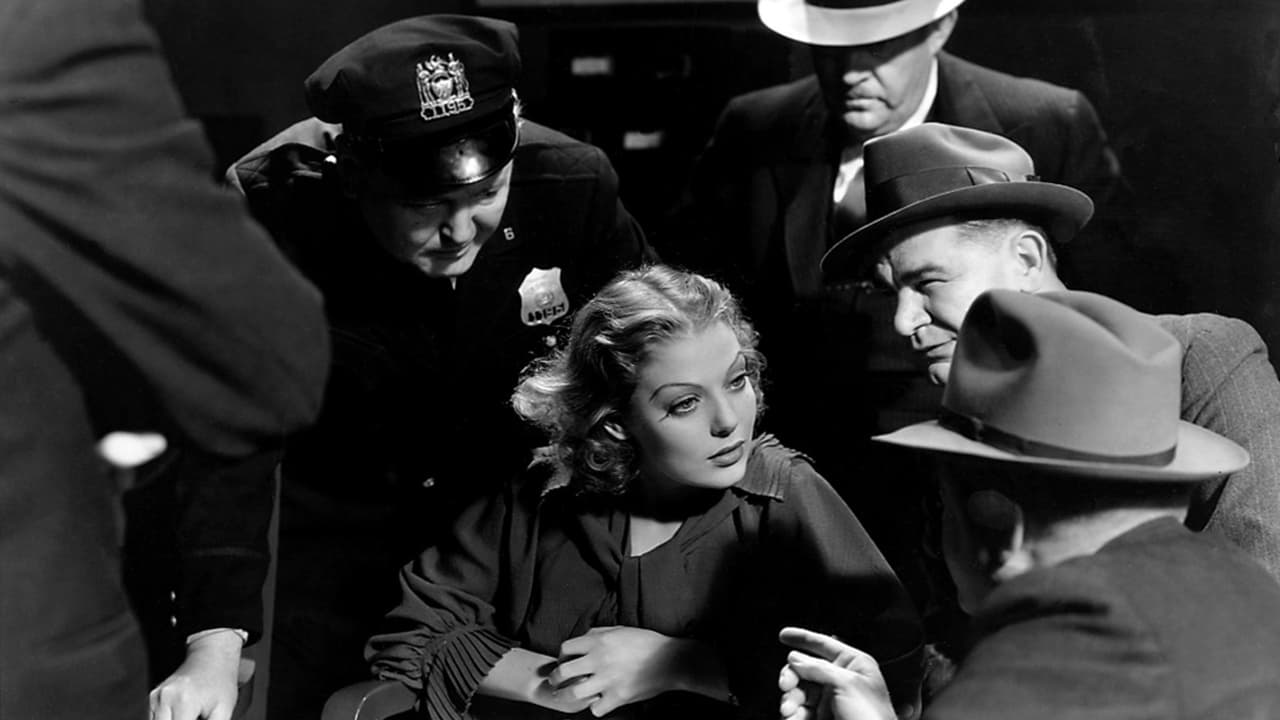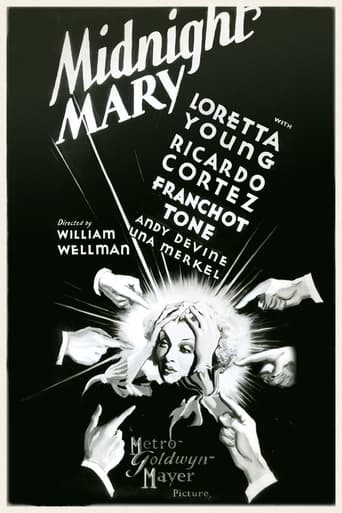Matcollis
This Movie Can Only Be Described With One Word.
BelSports
This is a coming of age storyline that you've seen in one form or another for decades. It takes a truly unique voice to make yet another one worth watching.
Sammy-Jo Cervantes
There are moments that feel comical, some horrific, and some downright inspiring but the tonal shifts hardly matter as the end results come to a film that's perfect for this time.
Married Baby
Just intense enough to provide a much-needed diversion, just lightweight enough to make you forget about it soon after it’s over. It’s not exactly “good,” per se, but it does what it sets out to do in terms of putting us on edge, which makes it … successful?
wes-connors
While waiting for the jury's decision at her murder trial, beautiful Loretta Young (as Mary Martin) recalls her life, in flashback. An unfortunate childhood ends with Ms. Young being sent to a reform school; upon release, she falls in with a bad crowd, led by handsome Ricardo Cortez (as Leo Darcy). In an attempt to go legit, moll Young meets suave lawyer Franchot Tone (as Tom Mannering Jr.); and, they fall in love. Then, predictably, Young's past catches up with her… Young and chum Una Merkel (as Bunny) are remarkably good playing themselves as young girls, in the opening; and, Mr. Cortez plays his final scene very well, as directed by William A. Wellman. An interesting, but irrelevant, newspaper headline reads, "Hitler Said to Be Gaining in Popularity", after Andy Devine (as Sam Travers)'s voice cracks. ***** Midnight Mary (6/30/33) William A. Wellman ~ Loretta Young, Ricardo Cortez, Franchot Tone, Una Merkel
MartinHafer
This film is done in an old fashioned style that doesn't play so well for modern audiences who aren't familiar with the style of early 30s "Pre-Code" films. Since I am a huge fan of older films (much more than modern ones), I could forgive all the melodrama and improbabilities that occur in the film--it was the style of the day.The film begins with Loretta Young on trial. Oddly, she refuses to do anything to defend herself and the film soon goes to a flashback of her life. Oddly, director Wellman decided to use Loretta and Una Merkel for some of the early scenes--where they were both supposed to be only 9 years-old! He used large props and changed their dress and hair styles, but they looked a heck of a lot older than 9! In the teenage portion, Loretta was able to pull this off much better since she was still rather youthful when she made this movie.All these early snippets help to show how Loretta gravitated towards a life of crime even though, in some ways, she was a nice girl. When the film moves forward to the late 1920s, the movie slows its pace and instead of brief snippets we follow her as she joins up with a gang headed by tough guy Ricardo Cortez. Here, she is reunited with Merkel--who is quite the floozy--a big departure compared to ladies she played in most other films. Aside from allowing herself to be slapped around, Una also apparently loves premarital sex, as she later gets pregnant. They never say where the kid came from, but I assume it wasn't an immaculate conception! With this and some of the other violence in the film, it's obvious that this Pre-Code film is indeed typical of the racier style of films of the early 30s--something that would be banned starting just a year later with the new and tougher Production Code.Along the way, Loretta meets up with the rich and very nice Franchot Tone. However, Loretta realizes that her checkered past will kill Tone's career as a lawyer, so she quiet disappears--turning herself into the police for her part in a robbery. When she gets out of jail, she deliberately avoids Tone and goes back to the brutal and nasty Cortez--all because she loves Tone too much to mess up his life.Exactly where it goes from there and how it all ends up in court is very entertaining, but I don't want to spoil the surprises. Despite being a tad old fashioned, the Pre-Code morality also makes the film pretty exciting, as most people don't realize how wicked these old films were (they were definitely NOT prudes like we like to think they were). A busy but highly entertaining script, decent performances and excellent direction--this is worth a look.
FERNANDO SILVA
Wow! What a movie! Definitely one of the best Pre-Codes I've seen. Swiftly paced, perfectly edited, with Loretta Young at her most beautiful and giving one of her most believable and honest performances.After seeing many of Loretta's films from the early 1930s, now I think that she gave her best performances in this period of time. There is a quality of freshness and naturalness, that gives much more truth to Loretta's portrayals in the early 1930s than to her interpretations of the late 1930s and 1940s, with few exceptions. Besides, those huge, beautiful eyes of hers, that smile, those apple cheeks, that slender figure so perfect for those early 1930s gowns, never looked better than in this period.Here she impersonates a doomed girl, who's known all the ugly aspects of life; the film begins when she's being tried for murder. The movie is told via-flashbacks and depicts how she got into this situation. It's so strange that this picture was produced by MGM; it could have been perfectly done at Warner Brothers. Well, the director, William Wellman, had been making lots of films on the Warner lot (Loretta as well), so he must have put much of the Warner's "Touch" and "mood" into it, perfectly blending it with MGM's gloss and top production values.Ricardo Cortez is excellent as the "aparently" suave gangster in love with Loretta and Franchot Tone is aptly cast as a society lawyer who falls for her. An excellent cast of supporting actors include Una Merkel, Warren Hymer, Martha Sleeper and those usual reliable butlers: Robert Greig and Halliwell Hobbes.I found this film so entertaining, so timeless, so modern in many ways. Pre-Code Fans don't dare to miss it!
goblinhairedguy
This is a seldom-discussed but highly significant title in the pre-code canon, as it delineates the compromises a pretty and (originally) moral young woman must make to extricate herself from poverty during the depression. Overall, it's a predictable melodrama, very typical of its period, and the fact that Wild Bill Wellman was for some reason working at MGM for this one tends to stultify the brashness that was his trademark in his early years at Warners. Nonetheless, the tricky editing is very Warners-like and keeps the story moving at a rapid pace, particularly in the jaw-dropping montage where the eponymous character loses her virginity. Most importantly, the script is very frank about sex and absolutely cynical about American society at the time. The most notorious scene is all innuendo -- in order to distract her gangster paramour, Mary inaudibly whispers in his ear, obviously relating in quite some detail the pleasures she will endow him with if only he comes to bed with her immediately. Loretta Young is luminous as always and Ricardo Cortez has a nice time with his role as a confident hoodlum who knows he has her on a string. As for Franchot Tone and Grady Sutton...

